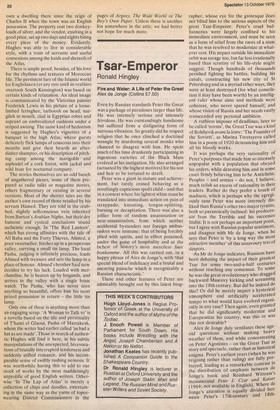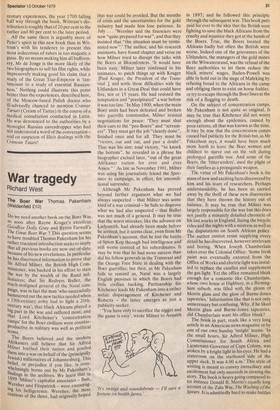Tsar-Emperor
Ronald Hingley
Fire and Water: A Life of Peter the Great Alex de Jonge (Collins £7.50) Even by Russian standards Peter the Great was a package of paradoxes larger than life. He was intensely serious and intensely frivolous. He was outstandingly handsome but suffered from a disfiguring form of nervous vibration. So greatly did he respect religion that he once clinched a doctrinal wrangle by murdering several monks who chanced to disagree with him. He spent much of his time drunkenly participating in ingenious varieties of the Black Mass evolved at his instigation. He also arranged (actuated by the highest motives) for his son and heir to be tortured to death.
Peter was a giant in stature and achievement, but rarely ceased behaving as a revoltingly capricious spoilt child — and that in a context where his lightest whim must he translated into immediate action on pain of strappado, knouting, tongue-splitting, burning or decapitation. There was also a jollier form of random assassination or near-assassination, from which neither accidental bystanders nor foreign ambassadors were immune: that of being forcibly plied with spirits, and in effect poisoned, under the guise of hospitality and at the behest of history's most merciless faux bonhonune. All this was carried out, in a happy phrase of Alex de Jonge's, with 'that special blend of indelicacy and a brutal and uncaring panache which is recognizably a Russian characteristic.'
These and other features of Peter are admirably brought out by this latest biog rapher, whose eye for the grotesque does not blind him to the serious aspects of the great Tsar-Emperor. Peter's cruel buffooneries were largely confined to his immediate environment, and must be seen as a form of relief from the cares of a state that he was resolved to modernize at whatever cost. His impact outside his immediate orbit was savage too, but far less irrationally based than scrutiny of his life-style might suggest. Though hundreds of thousands perished fighting his battles, building his canals, constructing his new city of St Petersburg and in a myriad other ways, they were at least destroyed (for what consolation it may have been worth) by an intelligent ruler whose aims and methods were coherent, who never spared himself, and whose vision of Russia and her needs vastly transcended any personal ambition. A ruthless imposer of deadlines, later to be called 'norms', the Great Tsar was a kind of Bolshevik avant la kttre: 'The Founder of the Soviets', as Marina Tsvetayeva called him in a poem of 1920 denouncing him and all his bloody works.
It was perhaps the very rationality of Peter's purposes that made him so intensely unpopular with a population that obeyed his orders, while detesting him and in some cases firmly believing him to be Antichrist. Peoples — and armies — do not, I believe, much relish an excess of rationality in their leaders. Rather do they prefer a touch of madness, which is perhaps why the egregiously sane Peter was more intensely disliked than Russia's other two major tyrants, both so paranoically inclined: his predecessor Ivan the Terrible and his successor Stalin. It is not perhaps an important point, but I agree with Russian popular sentiment, and disagree with Mr de Jonge, when he says that Peter is 'by a long way the most attractive member' of this unsavoury trio of despots. As Mr de Jonge indicates, Russians have been debating the impact of their greatcst Tsar for some two-and-a-half cent Lines without reaching any consensus. To some he was the great revolutionary who dragged backward Muscovy kicking and screaming into the 18th century. But did he indeed do this? Or did he merely impart a hysterical atmosphere and artificially accelerated tempo to what would have evolved organically in any case? Then again, even granted that he did significantly modernize and Europeanize his country, was this or was this not desirable?
Alex de Jonge duly ventilates these ageold questions without making heavy weather of them, and while concentrating on Peter Agonistes — on the Great Tsar as story and spectacle, rather than as histoncal enigma. Peter's earliest years (when he was reigning rather than ruling) are fully ['ortrayed, leading to a remarkable contrast in the distribution of emphasis between cl,e Jonge's book and Reinhard Wittram s monumental Peter I: Czar und Kaiser (1964; not available in English). Where de Jonge's attention equally d i vi d dbet ween peters17tncenturyandi8tn
century experiences, the year 1700 falling half way through the book, Wittram's distribution is roughly that of 20 per cent to the earlier and 80 per cent to the later period.
AU the same there is arguably more of Peter's spirit in this new book than in Wittram's with his tendency to present this most indecorous of rulers in too majestic a guise. By no means making him all buffoonery, Mr de Jonge is the more likely of the two biographers to sell his film rights, while impressively making good his claim that a study of the Great Tsar-Emperor is 'tantamount to a study of essential Russianness.' Nothing could illustrate this point better than the experiences, described here, Of the Moscow-based Polish doctor who ill-advisedly chanced to mention Cramor Tartari (Cream of Tartar) in the course of a medical consultation conducted in Latin. He was denounced to the authorities by a monoglot Russian eavesdropper who had not understood a word of the conversation — and on suspicion of illicit dealings with the Crimean Tatars!



































 Previous page
Previous page